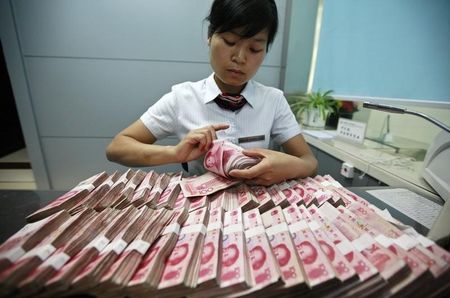By Engen Tham
SHANGHAI (Reuters) - Smaller Chinese banks that have raised deposit rates higher than their large rivals may be rewarded with a short-term inflow of money, but are unlikely to break the trend of investors parking cash in big banks and high-yielding "shadow bank" products.
At least eight small- and mid-sized lenders raised their one-year deposit rates to the 3.3 percent maximum on Saturday after the central bank unexpectedly cut interest rates for the first time in over two years to help support the economy.
Mid-sized banks are suffering more than big lenders from soured loans and a profit slowdown, and are keen to maintain their deposits.
"Smaller banks have more difficulty getting deposits," said Edmond Law, a banking analyst at UOB Kay Hian (Hong Kong) Ltd. "The key is, the large banks have enough deposits, so they have no urgency to do so."
Some of the country's top banks, such as Industrial and Commercial Bank of China Ltd, have only lifted their key deposit rate to 3 percent, giving smaller peers an opening.
But analysts said that will only bring short-term relief, until the larger rivals eventually follow suit.
The eight lenders that have lifted their deposit rates to the maximum level are Bank of Jiangsu [BNKJS.UL],Bank of Nanjing, Bank of Suzhou, Bank of Ningbo, Zijin Agricultural Bank, Ping An Bank, Evergrowing Bank [EGRBK.UL] and the Chaozhou Commercial Bank.
Smaller and mid-sized lenders could potentially bring more competition to China's banking sector, which is dominated by a state-owned "big four". But they are finding it hard to compete with the burgeoning shadow finance industry.
INCREASED COMPETITION
Bank deposits overall have been falling due to competition from online money-market funds that offer higher investment returns.
The banks' rise in deposit rates will do little to change this trend as yield differentials remain significant, analysts said. For example, Yu'e Bao, an internet investment product offered by Alibaba Group Holding Ltd, offers an annualised return of 4.07 percent.
"Yu'e Bao's interest is much higher than at banks, so even with the rate increase, movement from Yu'e Bao to banks is not really possible," said Jiahe Chen, chief strategist at Cinda Securities.
China's wealth management sector has exploded in recent years, hitting around 12.8 trillion yuan ($2.06 trillion)(1.32 trillion pounds) - around 11 percent of bank deposits - by the end of May, state media reported.
Another factor working against greater competition for deposits, some analysts say, has been the lack of a deposit guarantee scheme.
China has said it will roll out an insurance system that will cover deposits of up to 500,000 yuan ($81,492), as a move towards a market-oriented interest rate regime could put depositors at risk.
For many depositors, however, such considerations are secondary, as they have long believed the state would ultimately bail-out struggling lenders.

"I'm considering changing from a state-owned bank to a smaller one just for the interest," said a 32-year-old IT worker, who gave only his surname, Wang. "The credit risk in smaller banks is okay for me."
(Additional reporting by Clark Li in Beijing and Samuel Shen and Shanghai Newsroom in Shanghai; Editing by Kazunori Takada and Alex Richardson)